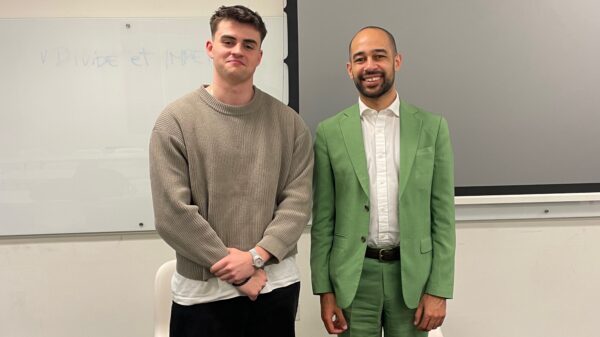Staff Writer, Rebecca Filer, demonstrates the calls for further action on violence against women and girls and examines if enough is being done to tackle this “national emergency”.
Greta Gerwig made history as the first woman to be the sole director of a billion-dollar grossing film with her record-breaking Barbie. The film documents Barbie’s transformation from a doll in utopian “Barbie Land”, devoid of all agency and unable to experience the gamut of human emotion, to a woman who makes the conscious choice of becoming human after living in the real world: “I want to do the imagining, not be the idea”.
Barbie’s journey therefore serves as a microcosm of the path to womanhood, with Gerwig seeking to capture the loss of wonder and innocence girls experience as they encounter the world. This carries a particular focus on the effects of the patriarchy and misogynistic behaviour. Gerwig’s portrayal of the female experience at the hands of the patriarchy clearly resonated deeply with its audience. The film’s popularity can be in part attributed to its painful relatability among female viewers, a product of their perennially frustrated desire to be taken seriously. This desire is exemplified by America Ferrera’s highly acclaimed monologue on the impossible contradictions and demands of the patriarchy.
However, one of the most relatable scenes occurs after both Barbie and Ken enter the real world, upon which Barbie comments on the “undertone of violence” she perceives when being catcalled and ogled at by men, one of which later sexually assaults her. This concise observation speaks to the normalisation of violence against women and girls that pervades our culture.
Furthermore, echoing Gerwig, Netflix’s Sex Education also illustrates this “undertone of violence” in a series of poignant scenes in the seventh episode of season two, in which six of the series’ major female characters, after being challenged to find “what binds [them] together as women”. Ultimately, they realise after sharing their experiences with sexual harassment and assault that the single uniting factor between them is “non-consensual penises”.
These poignant scenes in popular media cast light the harrowing daily realities faced by the overwhelming majority of women and girls; misogynistic violence and harassment is so deeply entrenched within our society that whilst almost all women have experienced sexual violence, these crimes are normalized as part of a “coming of age” narrative entrenched in the media. For women and girls, an “undertone of violence” is an inescapable part of life they are forced to contend with, living every day with the ever-present threat of misogynistic abuse looming over them.
Ungarnished numbers expose the brutal extremes of misogyny in the UK. A 2021 study conducted by U.N Women found that 97% of women aged 18-24 in the UK have experienced sexual harassment in public spaces, with 70% of women of across all ages reporting to have suffered the same experiences. The advocacy group ‘Everyone’s Invited’ exposed the prevalence of misogyny in thousands of schools and universities across the UK in its 2022 Schools and Universities List. This listed each institution in which students have used the platform to share stories of sexual violence and harassment they experienced whilst at school as part of the organisation’s mission to expose rape culture.
In 2022, Rape Crisis for England and Wales reported that one in four adult women had been sexually assaulted or raped, with nine in 10 girls and young women experiencing sexual harassment when in school. Out of the 67,169 reported rapes in 2022, only 1,276 charges were brought, a meagre 1.9%. Lady Louise Casey accused the Metropolitan Police of institutional misogyny in her report commissioned by the Met following the abduction, rape and murder of Sarah Everard by then-serving officer Wayne Couzens. The Femicide Census provides comprehensive, extensive annual reports on the women who are murdered every year by men in the UK. In 2020, 110 women were killed by men.
This is more than an “undertone of violence”. Violence against women is a devastatingly pervasive endemic.
In 2022, Prime Minister Rishi Sunak declared that sexual violence against women and girls “should be treated as a national emergency”, declaring that he “will not stop until we live in a society where women and girls can go about their daily lives feeling safe and secure”. Yet Sunak has continued to underfund vital domestic abuse services with Women’s Aid’s Chief Executive, Farah Nazeer, urging “the government to commit to fully funding specialist domestic abuse services for women and children in England, at £427 million per year” in her response to the government’s £76 million support package for charity and community organizations. In April, The Observer reported that more than 10,000 women had been denied safe housing after fleeing domestic abuse in England as local authorities lacked the resources and knowledge to provide these women with a refuge space. Furthermore, Labour MP Alex Davies-Jones condemned Sunak as “too slow” in recognizing and acting against the radicalization of young boys by incel culture and misogynistic influencers such as Andrew Tate. Sunak and his government have instead opted to engage in fuelling culture wars, with Sunak and the Minister for Women and Equalities, Kemi Badenoch, deciding to target transgender people and gender-neutral toilets, whilst the Home Secretary, Suella Braverman, blamed “political correctness” for institutional failures in tackling child sexual abuse. By stoking divisions and using the rights of women as means for political point-scoring, the government neglects the “national emergency” it declared.
Girls and women should not be forced to live within a systemically-violent social matrix. Yet the presence of sexual violence within mainstream media productions affirms how ingrained the status quo has become. The Women’s Aid manifesto for 2024 calls for government accountability and the creation of a cabinet-attending ministerial lead. A minister dedicated solely to violence against women and girls as part of a “whole-system response”, in which all governments departments recognise their responsibility in ending misogynistic and domestic violence. Steps such as those suggested by Women’s Aid reflect the urgency needed in addressing the endemic misogyny in the UK. Violence against women and girls is a “national emergency” and demands to be treated as such.















